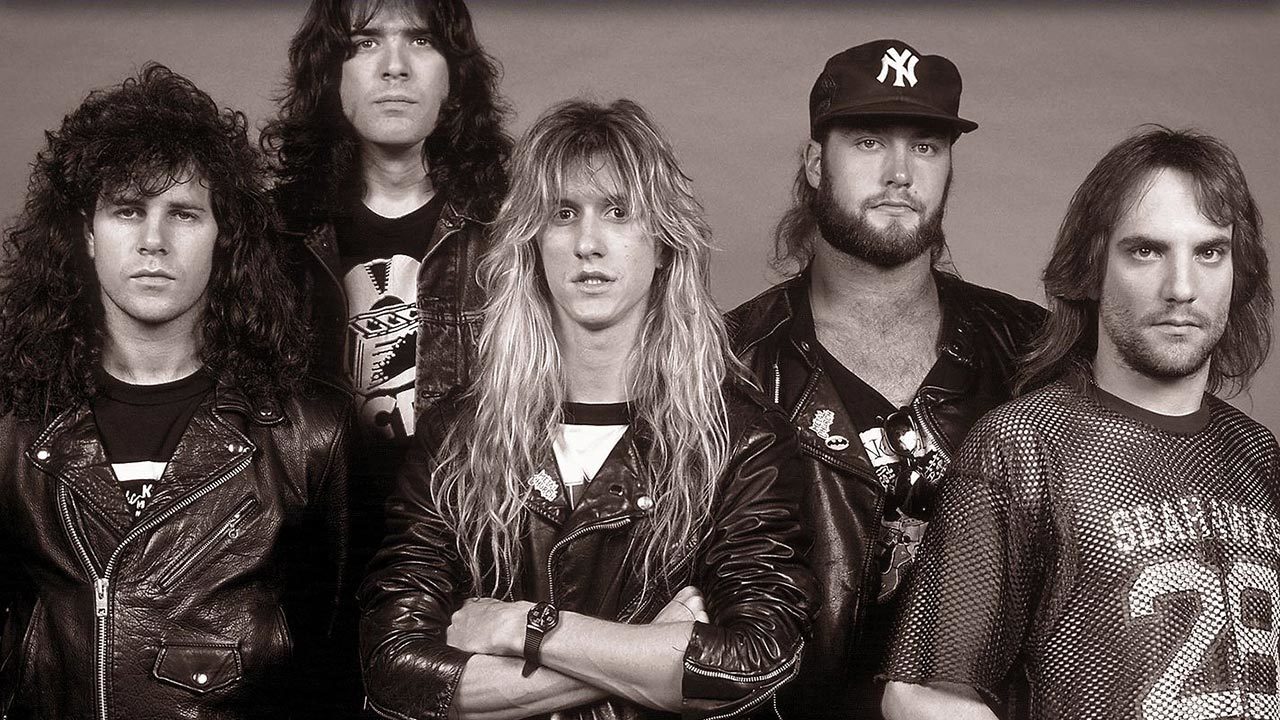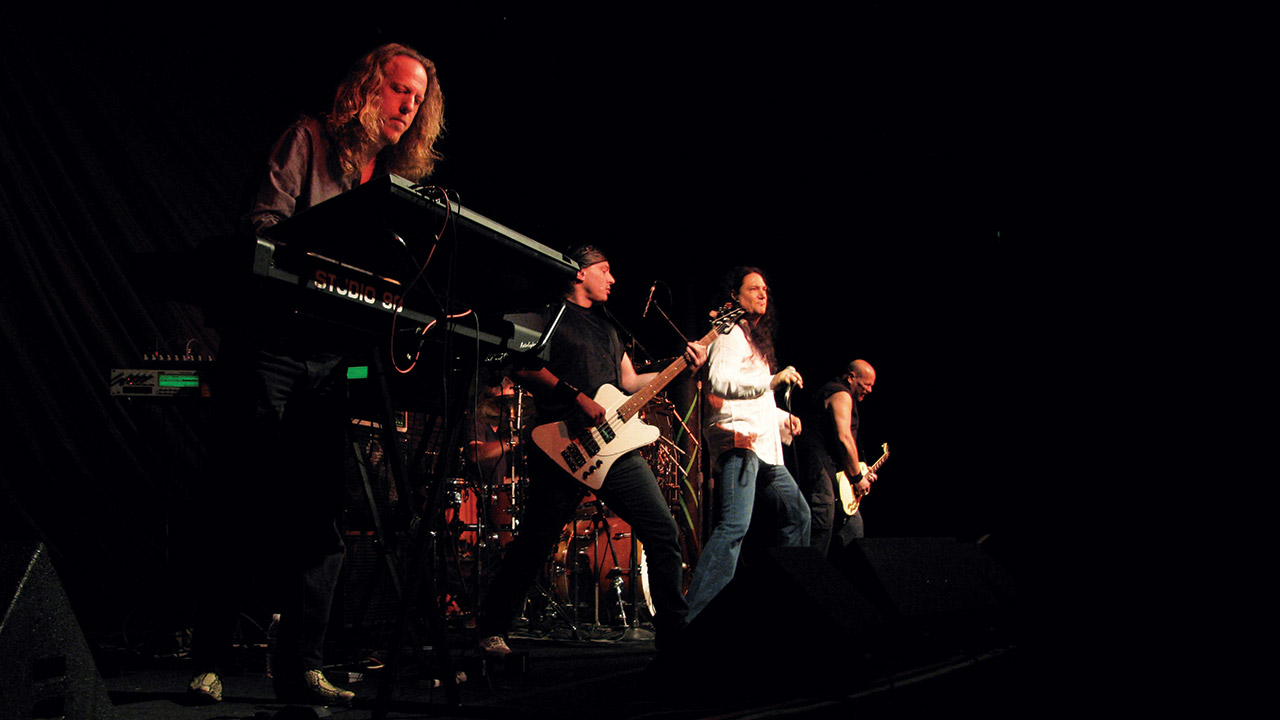There often comes a time when adults pause to reassess. Career goals and lifestyle priorities are awarded scrutiny and in certain extreme cases unlikely decisions are made. Some prove inspired, others catastrophic. But sometimes, just sometimes, everything works out for the best.
Kurdt Vanderhoof knows all about midlife crises, indeed he wrote a song about his own such experience for Presto Ballet’s new album, Invisible Places.
As a guitarist and songwriter of Metal Church during two separate spells, Vanderhoof had already achieved more than most in the cutthroat world of music. From 1980 to 1988 the Seattle-based band were regarded as pioneers of the original thrash metal scene with such genre-defining records as Metal Church (1984) and The Dark (’86). Having been part of a reunion that began in 1998, Kurdt remained onboard till a seemingly permanent second break-up 11 years later. At this point he’d already released two albums – Peace Among The Ruins (2005) and The Lost Art Of Time Travel (’08) – with his progressive rock side-project Presto Ballet.
The guitarist’s life was arriving at a crossroads. Should he remain on the path of expectation and form another heavy metal band, or follow his heart and devote himself to progressive music? This dilemma is verbalised in the song One Perfect Moment (‘There’s nothing for me here, frustrated middle age/I can’t pretend I’m happy and God I miss the stage’), which appears on the band’s new album.

“Yeah, that song’s autobiographical,” affirms Vanderhoof. “It would be an exaggeration to say I became bored with metal, but it’s a style of music that limits you. I like to be creative, which is why prog as an avenue is so appealing.”
Kurdt’s path to full-on progressive fulfilment began with a couple of albums by a band called Vanderhoof (“Those were in the vein of 70s rock; very Uriah Heep-ish,” he says of 1997’s Vanderhoof and its year 2002 successor, A Blur In Time). “All I was really doing was writing to entertain myself,” explains Vanderhoof, “and gradually it morphed into what I’m doing now. I wanted to make an album that would blow my mind.
“I really didn’t expect the response to the two Presto Ballet records to be so positive,” he admits. “They didn’t sell especially well; something in region of four or five thousand copies each, but the fact that they sold at all made them successes to me. Meanwhile, the last incarnation of Metal Church was becoming such a struggle. In the end we decided to pull the plug on the thing before we grew to hate it.”
Your scepticism, should it exist, is perfectly understandable. An apparently washed-up thrash metal guy turning his hand to prog rock was always going to generate cynicism. And yet exposure to the full, beauteous magnificence of Invisible Places causes all such reservations to vanish.
“I get comments like that a lot,” Vanderhoof shrugs. “But prog rock is what I grew up with. Back in the late-1960s and 70s I listened to prog as well as things like Black Sabbath. Eventually I reached a point with the whole metal thing where it just didn’t feel right anymore. I still love it…” he says, pausing to articulate himself a little better, “but I want to make music that I genuinely like, also that nobody’s doing anymore. Many of the bands from that era that are still out there, but with just a few exceptions they’re not doing the kind of music that I want to hear from them. I love Rush, for example, but it’s the Rush of the 1970s that’s my favourite.”
You must admit, he has a point. Yes and Kansas, both cited as significant influences upon Presto Ballet’s music, still exist, but the former’s current output doesn’t sound anything like The Yes Album or Fragile and, regrettably, Kansas don’t even make records anymore.
“Exactly,” Vanderhoof exclaims. “When I wake up and put on a CD by Yes or ELP, I want to hear them sounding like Yes and ELP!”
At the height of his fame Vanderhoof didn’t give too many interviews pledging undying allegiance to all things progressive. Was he forced to hide his true musical passion under a metaphorical bushel?
“It wasn’t like that at all – the subject never even came up,” Kurdt insists. “Later on I did those couple of solo [Vanderhoof] records that were more in a rock vein [than thrash], but even then journalists didn’t ask. I was never ashamed of it, put it that way. Even during the mid-80s when I was still thrashing my brains out, I’d still be listening to Styx. It was never really an issue until the whole style of music began its current resurgence, which I must say gives me such happiness and pride.”
It’s during a dialogue about this same popularity rebirth that Vanderhoof throws the whole tale on its head.
“When I realised that there is actually a market for this kind of music I thought: ‘That’s it, I’m in!’” he volunteers cheerily. “That’s why I’m relocating the band to the UK.”

You’re doing what?!
“We’re moving to England!” he laughs. “There’s nothing going in the US. There are prog fans here, but the place is so geographically large it’s hard to do anything worthwhile. Were we to play in Seattle, 15 people would show up. In the UK there’s Prog Magazine; exciting things are going on in the Netherlands. If I stay here I’m just going to be waiting tables again. At my age, I’m just flabbergasted that I can still do this legitimately anyway, so I’m going to give it shot.”
He continues: “We played a great show with Dream Theater, which was a complete fluke because they had a day off on their tour with Iron Maiden and wanted to play a headline gig. Mike [Portnoy] called me up and asked if we would support them. The answer was ‘Fuck, yeah!’ We went down fantastically well, but after the show it was a case of: So now what? Seattle is so dead that we can’t even find a permanent drummer. We’ve been looking for two years for a guy that can get his head around our time signatures. Maybe we’ll find somebody in London?”
The band drafted in a session man, Henry Ellwood, to perform the drum parts on Invisible Places. In fact, save for Vanderhoof, their entire line-up has been revised since The Lost Art Of Time Travel. The reason for this is simple.
“Basically, I needed people that could be part of a fully-functioning band, as opposed to a side-project,” he explains. “They had to be of the same age-group as myself, and committed to releasing records and going out on tour. I needed to work with people that cared as much as I do.”
The first to join Vanderhoof in the refurbished Presto Ballet was a name the guitarist knew he could trust. Step forward Ronny Munroe, a former Metal Church/Lillian Axe frontman who once studied under the same voice tutor that coached Queensrÿche’s Geoff Tate and Ann and Nancy Wilson of Heart. Munroe’s soaring vocals are one of the album’s most exciting features, causing Classic Rock’s Geoff Barton to suggest that the band sound like “Starcastle fronted by [Iron Maiden’s] Bruce Dickinson.”
“Ronnie is very excited about actually getting the chance to sing,” quips Kurdt. “He’s a metal guy, but he has a fantastic set of pipes.”
Bass player Bobby Ferkovich is another with metal affiliations, having played
with Heir Apparent and Powertrain among others.
“It was equally tough finding a bassist who could play this style of music,” states Vanderhoof. “There were just two suitable people on my list of local musicians, which says much of how pathetic the scene in Seattle is becoming.”
Amazingly, keyboard player Kerry Shacklett was discovered via YouTube.
“I’d been searching for 18 months when I found him on there playing Emerson Lake & Palmer covers,” Vanderhoof laughs. “He’s such a monster, I wrote saying: ‘Call me now, you are joining this band’. Kerry lives in Reno and I sent him the plane tickets; I literally forced him.”
These personnel changes were made too late in the day for any of the newcomers to have become involved in composing the music, Vanderhoof having written exclusively and split the lyrics with Munroe, though the group’s leader insists that the door will be open next time around.
“We’re going to start writing the next album before we leave for the UK,” he reveals, before guffawing: “We’re not messing around – hey, I’m pushing 50; I don’t have much time left!”
Unlike certain Metal Church offerings such as Ton Of Bricks, which offered the gruesome lyric of ‘Ripping flesh and drawing blood/I’d love to eat your bones’, Presto Ballet songs like The Puzzle and Of Grand Design project themes of positivity and/or self-discovery.
“I just got tired of the darkness; I guess I’m just not that angry anymore,” reflects Vanderhoof. “At 23 years old I was into all that stuff, but now when I write lyrics I want to make myself and the listener feel better. How many times can you sing about stabbing or murdering somebody before it just feels old?”
The album’s cover image of a lad wearing a Who T-shirt and listening to
a vinyl album on headphones on his bed, which floats on a bed of fluffy clouds,
is as symbolic of musical purity as Vanderhoof’s spurning of digital
recording techniques.
“An entire generation of music fans did that,” he reminisces over the sleeve. “You’d sit there and listen to Led Zeppelin and for that period of time nothing else mattered expect being in Led Zeppelin land. With no such things as iPods the whole fantasy of rock’n’roll was something that existed in your head.”
Presto Ballet, who insist upon using a real Hammond organ, clavinets and Mellotrons, also look back with fondness on the days when records were made by bona fide musicians.
“The bottom line is that I fucking hate cheats!” scowls Vanderhoof. “These days everybody’s records sound the same. Cut and pasted and edited over and over, they’re just too perfect. Queen didn’t have a pitch correcting machine in 1973, they had 16 tracks of analogue and it sounded way better.”
After spells with InsideOut Music and ProgRock Records respectively, PB have elected to self-release Invisible Places.
“Bands making and selling their own albums is one of the very few positive aspects of the internet,” believes Vanderhoof, who hates the impact of web thievery upon rock music. “Nobody sells records anymore unless you are Justin Bieber or some hip-hop artist that plays arenas,” he points out with a semi-revolted sigh. “What really bothers me is that within two days of Invisible Places coming out it had been posted on several different pirate sites. It’s something that everybody has to deal with, but boy is it discouraging.”
Maybe we should cut Kurdt Vanderhoof a break; he’s just doing what he loves.
Finally…
This article originally appeared in issue 16 of Prog Magazine.

